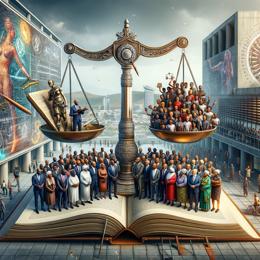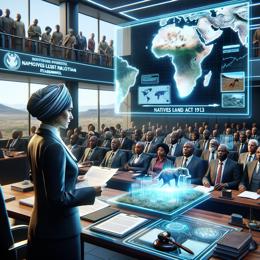Image created by AI
Cradock 4 Case Revival: SANDF Legal Head Summoned Over Apartheid-Era Funding Issues
In a significant development that underscores the enduring complexities of South Africa's apartheid legacy, Masilo Lekoloana, the head of legal services for the South African National Defence Force (SANDF), has been subpoenaed to appear before the Gqeberha High Court. Slated for Tuesday, his court appearance is anticipated to address pressing issues concerning the SANDF's refusal to cover legal fees tied to an apartheid-era officer linked to the notorious Cradock Four murders.
The case revolves around former Lieutenant-General Stoffel van der Westhuizen, a pivotal figure accused of involvement in the orchestration of the deaths of Matthew Goniwe, Fort Calata, Sparrow Mkhonto, and Sicelo Mhlauli in 1985. These individuals, collectively known as the Cradock Four, were anti-apartheid activists whose tragic demise has haunted the nation's conscience for decades. Notably, several accused individuals had sought amnesty from the Truth and Reconciliation Commission (TRC), but were denied.
The pivotal legal question now is the funding of Van der Westhuizen's defense. At 83 years old and reportedly in declining health, there is a substantial risk that he may never testify if the legal intricacies are not swiftly resolved. This situation has intensified calls for justice from the families of the victims, who have persevered through various legal proceedings, including two previous inquests and the ongoing third inquest into the murders.
Van der Westhuizen, who was the commanding officer of the Eastern Province Command and a member of the Joint Management Committee at the time, allegedly ordered the permanent removal of the Cradock Four, a directive linked directly to their murders. Despite the gravity of the accusations, he did not apply for amnesty, thereby maintaining his silence throughout the TRC proceedings.
The current legal confrontation reaches beyond individual accountability, touching on broader themes of justice, reconciliation, and the state's role in addressing past crimes. As Lekoloana prepares to appear in court, the outcome could have significant implications for South Africa's efforts to confront its past fully and ensure accountability within its ranks.
The testimony from van der Westhuizen and other former state officials is scheduled from October 13 to 24, 2025, offering a framework for potentially pivotal revelations that could alter the historical narrative around one of apartheid's most brutal chapters.
As the court date approaches, all eyes will be on Gqeberha, waiting to see whether this legal engagement moves South Africa closer to resolving a dark chapter in its modern history and whether the families of the Cradock Four might finally receive the closure they have long sought.










